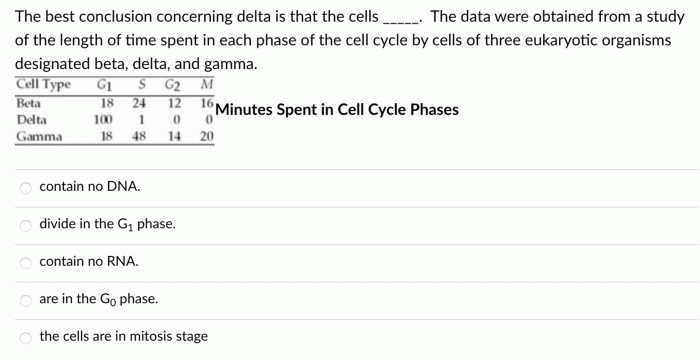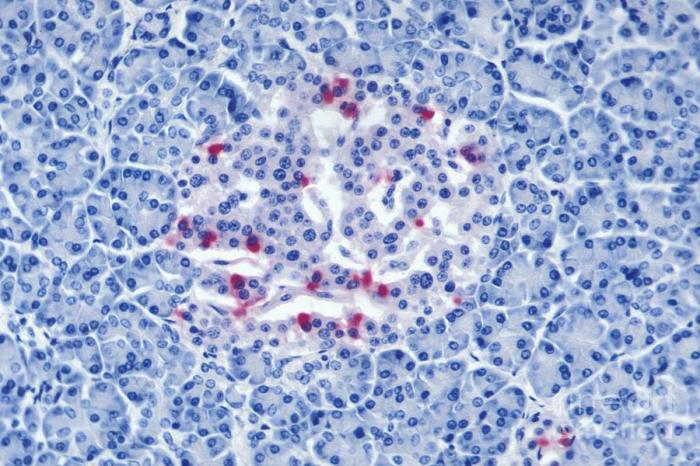The best conclusion concerning delta is that the cells – Unveiling the intricacies of delta cells, this comprehensive analysis delves into their multifaceted roles, from the intricacies of cell division to their profound influence on tissue morphogenesis, cancer development, immune function, and plant biology. Through a captivating exploration of their unique characteristics and mechanisms, we uncover the profound impact of delta cells on various biological processes, unraveling their significance in shaping cellular behavior and physiological outcomes.
Delta Cells and Their Role in Cell Division

Delta cells, also known as cytokinetic cells, are specialized cells that play a crucial role in cell division. During cytokinesis, the final stage of mitosis, delta cells form a contractile ring that constricts the cell membrane, ultimately leading to the separation of the two daughter cells.
Delta cells possess unique characteristics that enable them to carry out this essential function, including the ability to assemble and disassemble rapidly, as well as to generate contractile forces.
Mechanisms of Delta Cell Formation and Activation
The formation of delta cells is tightly regulated and involves several key mechanisms. During mitosis, the mitotic spindle apparatus plays a critical role in organizing and positioning delta cells. The spindle poles serve as nucleation sites for the assembly of delta cell components, which are transported along microtubules to the equatorial region of the cell.
Once assembled, delta cells undergo a process of maturation and activation, which involves the recruitment of additional proteins and the phosphorylation of specific components. This activation process ultimately leads to the contraction of the delta cell ring and the completion of cytokinesis.
Delta Cells and Tissue Morphogenesis

In addition to their role in cell division, delta cells also play a crucial role in tissue morphogenesis, particularly during embryonic development. Delta cells are involved in the formation and shaping of various tissues and organs, including the neural tube, the heart, and the limbs.
They contribute to tissue morphogenesis by regulating cell shape changes, cell migration, and cell-cell interactions.
Signaling Pathways and Molecular Mechanisms
The role of delta cells in tissue morphogenesis is mediated by various signaling pathways and molecular mechanisms. Delta cells secrete signaling molecules that bind to specific receptors on neighboring cells, triggering downstream signaling cascades that regulate cell behavior. These signaling pathways involve the activation of transcription factors and the expression of specific genes, ultimately leading to the coordinated shaping and organization of tissues.
Delta Cells and Cancer: The Best Conclusion Concerning Delta Is That The Cells

Recent research has explored the potential involvement of delta cells in cancer development and progression. Delta cell dysfunction has been linked to the formation and growth of certain types of cancer, including breast cancer and colon cancer. Alterations in delta cell function can lead to abnormal cell division, uncontrolled cell proliferation, and the formation of tumors.
Therapeutic Implications
Understanding the role of delta cells in cancer could lead to novel therapeutic strategies for cancer treatment. Targeting delta cells or their signaling pathways could potentially inhibit tumor growth and progression. Further research is needed to validate the therapeutic potential of delta cells in cancer and to develop effective treatment strategies.
Delta Cells and Immune Function
Delta cells also play a role in immune responses and immune function. They interact with various immune cells, including T cells and B cells, and contribute to the regulation of immune surveillance and immune tolerance. Delta cells can present antigens to immune cells, activating an immune response against pathogens or foreign substances.
Implications in Immune Disorders, The best conclusion concerning delta is that the cells
Dysfunction of delta cells can lead to impaired immune responses and contribute to the development of immune disorders and autoimmune diseases. For example, defects in delta cell function have been associated with autoimmune disorders such as rheumatoid arthritis and systemic lupus erythematosus.
Delta Cells in Plant Biology

Delta cells are also found in plants, where they play essential roles in plant development and physiology. In plants, delta cells are involved in cell division, cell expansion, and the formation of specialized structures such as trichomes and stomata. They contribute to the overall growth, shape, and function of plants.
Unique Features of Plant Delta Cells
Plant delta cells exhibit unique features compared to their counterparts in animals. They are typically larger and more persistent, and they contain specific proteins and cell wall components that are not found in animal delta cells. These differences reflect the specialized roles that delta cells play in plant development and physiology.
FAQ Overview
What is the primary function of delta cells?
Delta cells play a crucial role in cell division, particularly during cytokinesis, ensuring the proper separation of daughter cells.
How do delta cells contribute to tissue morphogenesis?
Delta cells participate in tissue morphogenesis by guiding the formation and patterning of specific tissues and organs during embryonic development.
Is there a link between delta cells and cancer?
Research suggests that delta cell dysfunction may contribute to the development and progression of certain types of cancer.